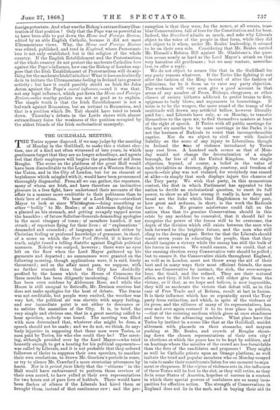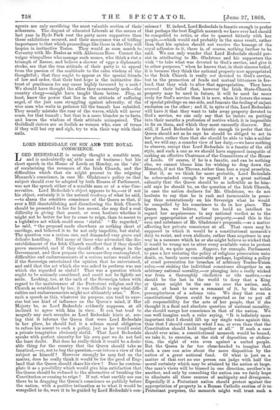THE GUTLDHALL MEETING.
THE Tories appear disposed, if we may judge by the meeting of Monday in the Guildhall, to make this a violent elec- tion, one of a kind not often witnessed of late years, in which _gentlemen forget that they are no longer schoolboys, and agents feel that their employers will forgive the purchase of aid from Roughs. The scene on the platform of the great Hall would have been discreditable to the Legislature of a Western State in the Union, and in the City of London, but for an element of boyishness which mingled with it, would have been pronounced thoroughly disgraceful. From all we can gather, the reporters, many of whom are Irish, and have therefore an instinctive pleasure in a free fight, have undertoned their accounts of the affair in a manner more creditable to their politeness than to their love of realism. We hear- of a Lord Mayor—stateliest Mayor to look at since Whitbington—doing something or 'other " bodily " to Mr. Beales ; of an Alderman fighting for a placard on his stomach, and getting savagely rapped across 'the knuckles ; of future Solicitor-Generals demanding apologies in the most vinegary of tones ; of members hustled, if not struck ; of reporters flying for their lives ; of " explanations " ,demanded and conceded ; of language not marked either by Christian feeling or profound knowledge of grammar, in short, of a scene on which the New York Herald, if it knew the truth, might found a telling diatribe against English political manners. Nobody was scalped, however ; there were no eyes left on the floor when the Lord Mayor gathered up his garments and departed ; no summonses were granted on the following morning, though applications were, it is said, freely threatened ; and so the affair must pass, we suppose, with no farther remark than that the City has decidedly profited by the lesson which the House of Commons for three months has been diligently inculcating. Colonel Knox has been even outdone by Alderman Rose, and while the House is still unequal to fisticuffs, Mr. Denison receives but does not make apologies for the heat of debate. The fracas was not creditable, but people were excited, the weather was -very hot, the political air was electric with angry feeling, and our immediate point is not either to denounce or to satirize the amenities of the City. It is, in brief, the very simple and obvious one, that in a great meeting called to bear speeches, nobody was heard. The meeting was filled with men determined that, whatever else might be done, a speech should not be made ; and we do not, we think, do any- body injustice in supposing that those men were Tories, or men paid by Tories, for who else could they be ? The meet- ing, although presided over by the Lord Mayor—who tried honestly enough to get a hearing for his political opponents— was called by Liberals, and it is not probable that they ordered 'followers of theirs to suppress their own speeches, to smother their own resolutions, to drown Mr. Goschen's periods in roars, lor try to silence Mr. Crawford's more stentorian utterances by hoots. Nor is it primci fade likely that the "citizens " in the Hall would have endeavoured to perform those services of 'their own accord, to have yelled at their own representatives for two hours out of pure love of hubbub. There would have 'been flashes of silence if the Liberals had hired them or brought them, instead of that continuous row ; and the pre-
sumption is that they were, for the nonce, at all events, true- blue Conservatives, full of love for the Constitution and for beer. Indeed, the Standard admits as much, and asks why Liberals object to the voice of the people in that form, while they did not object to it when, under Mr. Beales' leadership, it seemed to be on their own side. Considering that Mr. Beales carried Mr. Disraeli's Reform Bill against Mr. Gladstone's, the ques- tion seems nearly as hard as the Lord Mayor's attack on that very harmless old gentleman ; but we may venture, neverthe- less, to offer a reply. We do not object to scenes like that in the Guildhall for any party reasons whatever. If the Tories like fighting it out after the fashion of the Ring instead of after the fashion of politicians, far be it from us to raise any party objection. The workmen will very soon give a good account in that arena of any number of Peers, Bishops, clergymen, or other classes of society hitherto addicted to prefer brains to fists, epigrams to body blows, and arguments to bonnettings. If noise is to be the weapon, the mere sound of the tramp of the multitude will drown any artificial bellow, however liberally paid for ; and Liberals have only, as on Monday, to transfer themselves to the open air, to find themselves masters at least of the right of speech. If Tories wish all public meetings for the next six months to be mass meetings in the Parks, it is not the business of Radicals to resist that incomprehensible caprice. Nor do we object to civil war with limited liability on the score of any injury to Liberalism, though in Ireland the tone of violence introduced by Tories may cost lives. A hundred such scenes as that of Mon- day would not change the determination of a single borough, far less of all the United Kingdom. Our single objection, beyond, of course, a belief in the value of such trivialities as decency, dignity, courtesy, and freedom of speech—fair play was not violated, for everybody was roared at alike—is simply that such displays injure the chances of the Tory party. We wish that party, in this momentous contest, the first in which Parliament has appealed to the nation to decide an ecclesiastical question, to exert its full power, to show us all how strong it really is, how deep and broad are the links which bind Englishmen to their past, how great and arduous, in short, is the work the Radicals have to do. No greater misfortune could fall on the nation than that its genuine Conservatism should in this crisis by any accident be concealed, that it should fail to recognize the power of the forces still to be overcome, the depth of the division which still exists between the men who look forward to the brighter future, and the men who still cling to the decaying past. Better far that the Liberals should waste seven years in educating the people, than that they should imagine a victory while the enemy has still the bulk of his forces in reserve. We would ensure, if we could, that at the ensuing election every Conservative vote should be polled ; but to ensure it, the Conservative chiefs throughout England, as well as in London, must not throw away the aid of their best and in many ways their most efficient friends, the men who are Conservative by instinct, the rich, the over-scrupu- lous, the timid, and the refined. They are their natural allies, and they, if left free to act, will either give them the victory, or if that, as we hope and believe, is now impossible, they will so moderate the victors that defeat will, as in the case of Free Trade and of Reform, result at last in fusion. It is their influence which has so repeatedly saved the Tory party from extinction, and which, in spite of the violence of its press, and the silliness of many of its representatives, has over and over again restored it to its true place in politics, —that of the resisting medium which gives at once steadiness and force to the advancing machine. What place have the Tories by instinct in a scene like that at the Guildhall, amidst aldermen with placards on their stomachs, and mayors pushing at Mr. Beales, and crowds of Roughs shout- ing down the chosen representatives of their own city in elections at which the peace has to be kept by soldiers, and on hustings where the missiles of the crowd are less formidable than the fists of the candidates and proposers ? They might as well be Catholic priests upon an Orange platform, as well imitate the tried and popular members who on Monday essayed in vain to make their constituents listen for one moment to arga mentor eloquence. If the regime of violence sets in, the influence of these Tories will be lost in the riot, or they will retire, as they do in some States of America, hopeless of success in a contest in which their special powers of usefulness are so many inca- pacities for effective action. The strength of Conservatism in England does not lie in the mob, and in buying their aid its
agents are only sacrificing the most valuable section of their adherents. The disgust of educated Liberals at the scenes of last year in Hyde Park cost the party more supporters than these exhibitions secured, and their annoyance was of trifling importance to that which proceedings like those in the City will inspire in instinctive Tories. They would as soon march to Coventry with Mr. Beales as with Alderman Rose. Cannot the vulgar wirepullers who manage such scenes, who think a riot a triumph of finesse, and believe a shower of eggs a diplomatic stroke, see that the true attitude of their party is to appeal from the passion of the multitude to the calm wisdom of the thoughtful ; that they ought to appear as the special friends of law and order, that their best hope is the instinctive dis- trust of gentlemen for any cause highly favoured by a mob ? We should have thought the allies they so earnestly seek—the country clergy—might have taught them better. They, at least, know the power that lies in the attitude of suffering angel, of the just man struggling against adversity, of the wise man who waits in patience till the tumult has subsided. They usually mistake the .roar of the waves, which will never cease, for that tumult ; but that is a mere blunder as to facts, and leaves the wisdom of their attitude unimpaired. The Guildhall rioters are as foolish as women who, sure of terms if they will but cry and sigh, try to win their way with their nails.































 Previous page
Previous page